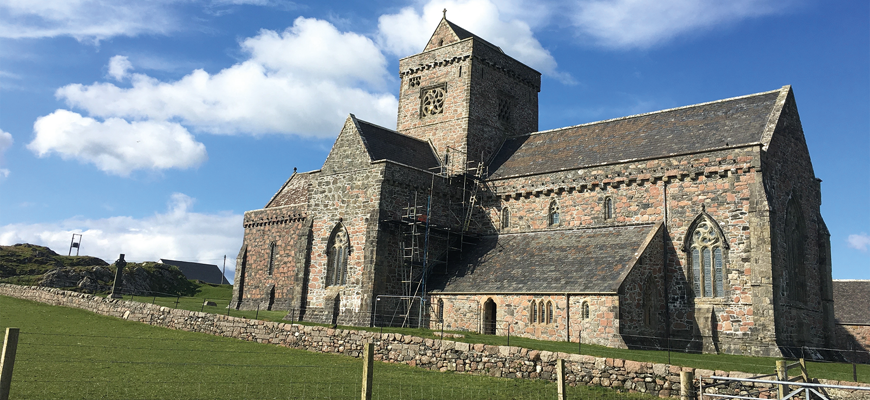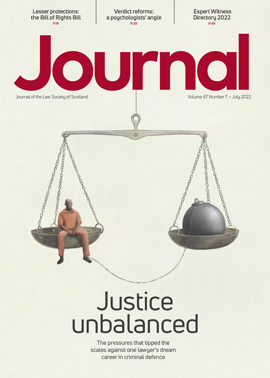In-house: In with the stonework

Tell us about your career path to date?
 Having discovered a love of intellectual property at Glasgow University, I secured a traineeship at Maclay Murray & Spens (“MMS”) (now Dentons), well known for its IP expertise. I returned to MMS’s IP team in 2005 and worked my way up to become a director and head of the IP & IT Litigation team in 2012, specialising in IP, IT and data protection matters, as well as commercial contract disputes.
Having discovered a love of intellectual property at Glasgow University, I secured a traineeship at Maclay Murray & Spens (“MMS”) (now Dentons), well known for its IP expertise. I returned to MMS’s IP team in 2005 and worked my way up to become a director and head of the IP & IT Litigation team in 2012, specialising in IP, IT and data protection matters, as well as commercial contract disputes.
In 2018, I was lured away from private practice to become head of Legal at Historic Environment Scotland (“HES”). I was attracted by the focus of the role on IP matters.
What are your main responsibilities?
I am responsible to our senior management team and chief executive for all legal matters (except property) within HES.
HES is an interesting organisation with an extensive range of activities. We look after 336 of Scotland’s historic sites, including iconic properties such as Edinburgh Castle, Arthur’s Seat and the Calanais Standing Stones, and operate them as visitor attractions. We also look after a broad range of archives and collections, many of which are made available digitally. We carry out lots of R&D work and regularly collaborate with universities on research projects. We do a lot of partnership working with other heritage bodies. In addition, we have a regulatory role in respect of listed buildings and scheduled monuments.
This broad remit gives rise to a wide range of legal issues and challenges and makes HES a fascinating place to work as a solicitor. My team advises on anything from commercial matters relating to our visitor attraction business, to health and safety issues, IP issues arising from our research work and our archives, and everything in between. HES is a non-departmental public body, so there are a lot of public law issues also, such as interpreting legislation that applies only to HES.
You were the first in-house solicitor HES had. What was it like going into that role? With the benefit of hindsight, is there anything you would have done differently?
I was indeed, and working at HES was also my first in-house role, apart from a couple of secondments. It was quite overwhelming at first, particularly as so many matters required attention. My line manager encouraged me to focus on small wins and not to try to do everything at once, which really helped.
A couple of high-profile issues requiring significant legal support arose within my first three months. While that was challenging, it accelerated the process of me becoming a trusted adviser to the senior management team.
With hindsight, I would have been more relaxed about not being familiar with every area of law. Although my private practice skills were quite specialist, they proved to be fairly transferable and I could call on external lawyers too. Working in-house, you have to be comfortable dealing with the unexpected.
You’ve now grown the legal team. How did you approach that process and were there any particular hurdles with securing the go-ahead from senior management?
I have felt very supported by the senior management team within HES from day one, and received support to recruit an additional solicitor when I had been in post for less than a year. We have since grown the team to add another solicitor. Having a solicitor from our external law firm on secondment helped make the case for additional in-house resource, as we could demonstrate that an extra pair of hands in-house helped us get through work a lot quicker.
In-house solicitors are sometimes badged as generalists, but you’re an accredited specialist in intellectual property. Is it important to you to maintain a level of specialism in a particular field? Does that impact the type of legal function you are?
I’ve always been really interested in IP and was only willing to move in-house to a role with that focus. However, the breadth of HES’s activities means that I’ve learned a fair amount about many other specialisms and I have really enjoyed that. I’ve discovered a particular interest in health and safety law as it applies to historic buildings and the natural environment – something I would never have considered if it hadn’t been for my HES role.
COVID-19 has created significant challenges for your sector. How has the organisation generally and the legal function in particular had to adapt?
COVID was very challenging for all areas of our business, but particularly the visitor attraction side. We had to close and reopen all of our staffed sites many times. The legislation was constantly changing. We had to get comfortable with giving advice on legislation/guidance which was made public at 4pm one day and took effect the next.
Thankfully, my team all worked from home at least some of the time even before the pandemic, so we were well set up from a technology perspective from the outset.
You were recently part of a panel of in-house solicitors for the Society’s “Conversations on Progression” series. Why do you think it important to share your experience as a senior female in the profession?
When, like me, you don’t have connections or a family background in law, it can feel like a very intimidating and inaccessible profession. To help open up the profession to everyone, it is really important to share knowledge and experiences. I’m still learning, and I certainly don’t have all the answers, but I’m always happy to share what I do know.
I benefited from some really useful help early in my career and I feel a responsibility to pay that forward. I worked at Turcan Connell as a summer student, and one of the partners put me in touch with his wife, who was a recruiter. She spent an afternoon helping me put a CV together for my traineeship applications. Her advice was incredibly useful and I follow some of it to this day! I believe her generously given advice was instrumental in helping me obtain a traineeship at my first choice firm.
Other advice that has helped me was a chance remark at an in-house lawyers networking event. One of the speakers said his mantra was “progress not perfection”. Of course, sometimes perfection is required, but often it isn’t, and hearing that from another senior in-house lawyer gave me permission to look at things in a more realistic way.
Do you think attitudes and working practices in the legal profession have changed since you started out? If so, for better or worse?
I do think things are improving, but in my view, the profession is still many years behind other sectors and cannot afford to be complacent.
Positive changes I have seen include more focus on diversity and inclusion. This has been very important for me as a gay woman who was advised early in my career (by some colleagues) to hide this. It took many years to break the habit of using non-gender-specific pronouns when making small talk with senior colleagues and clients. Attempting to hide a part of yourself while trying to build relationships is really challenging, and it made networking a real ordeal at times. It’s so important to allow people to be themselves.
I’m also glad that the profession has finally started to acknowledge mental health issues. We work in a demanding profession, and I think it’s important that things like stress and burnout are talked about, and that we take meaningful action to look after ourselves and our staff.
How does the future look for in-house lawyers? What are the key challenges and opportunities?
It’s a great time to be an in-house lawyer in Scotland. There are so many interesting in-house roles these days. There is a great opportunity to embed ourselves as trusted advisers and senior decision-makers in our organisations.
What advice would you give lawyers who want to start a career in-house? What makes a good in-house lawyer?
I would recommend gaining some experience in private practice before going in-house. At the right firm, you will get great exposure to a wide range of sectors and matters, which will really help in-house as it teaches you to consider many different perspectives. I would also recommend joining a network of in-house lawyers, as this will be an invaluable support.
In my view, to be a good in-house lawyer you need to be pragmatic, calm in a crisis, good with people, able to explain legal issues in plain English – and not sit on the fence!
What is your most unusual/amusing work experience?
I’ve had many comedy moments both in private practice and at HES!
In private practice, there was much amusement when we had a mannequin as a production in a patent infringement action. Our trainee christened him “Plastic Pete”!
And an amusing moment at HES involved a historically inaccurate bath duck…
Finally, what do you love about your role, and what do you love doing when the working day is done?
I love the variety of my role at HES and the occasional opportunity to go on-site visits. The highlight of my career to date is a three-day trip to Mull and Iona!
Outside work, I sing in Forth Valley Chorus (current UK women’s barbershop champions), and I enjoy outdoor swimming.
Perspectives
Features
Briefings
- Civil court: Issues on appeal
- Licensing: Minimum pricing – a genuine impact?
- Insolvency: How to admit joint creditor claims
- Tax: windfall and plastic packaging taxes raise stakes
- Immigration: Asylum system overhauled
- Scottish Solicitors' Discipline Tribunal: July 2022
- In-house: In with the stonework
- Property: Living with the Register of Overseas Entities
In practice
- OPG update: July 2022
- Public policy highlights: July 2022
- Gear up for the Scottish Legal Walks
- Disabled solicitor support group proposed
- Risk: Cybercrime – the hybrid worker prey
- Ask Ash: Piling it on
- TRS: time for a trusts trawl
- Know people, know business
- High street and hybrid
- Appreciation: Ian Leslie Shaw Balfour
- The Expert Witness Directory 2022
- Expert witness: case law update







